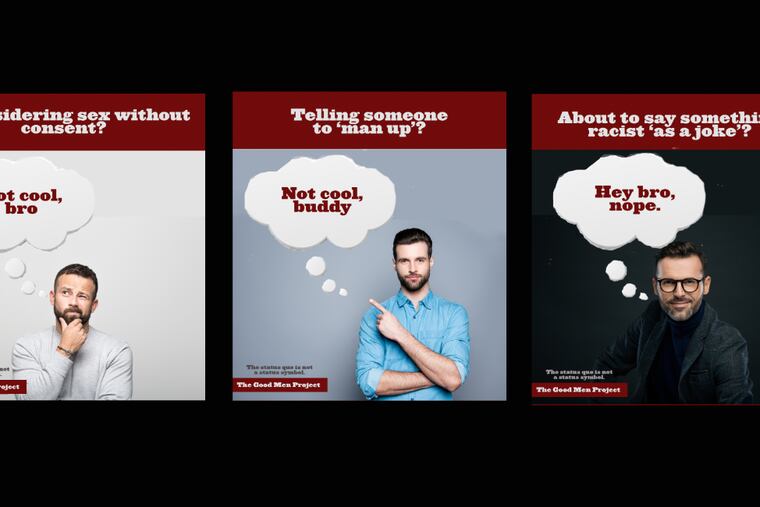In the wake of #MeToo, how can we reconcile women’s reality with men’s perspective? | Opinion
Moving forward requires engagement, understanding, and a willingness to change, as well as gaining the insight, compassion and tools to create safe relationships for everyone.

The #MeToo movement has inspired a critical examination of the pervasiveness of the problem of sexual assault and harassment, and has highlighted the need for a conversation most men have not yet had. There is real work to be done with men in order to break the patterns of abuse, harassment, and assault — and to change the systems that allow that to happen. More men need to stand up as vocal allies and help engage other men in this movement.
As activists and allies of both men and women, we find that many men feel that the problems #MeToo raises do not relate to them. Men rarely see themselves as ones who directly or intentionally harass, do not interpret their own behaviors as intimidating or threatening to women, nor see themselves as someone who would harass or assault women.
How then to reconcile this with women’s reality — a reality where one in three women are sexually assaulted and virtually all women are sexually harassed and experience sexism? While men, overall, are acutely aware of the harassment and assault covered in the media, there is a hesitancy to fully engage in the conversation about these issues; and for some there is a clear resistance to accept the legitimacy of women’s experience. “If that assault took place ten years ago, she should have filed charges then,” or, “It seems like every guy is at risk of someday being accused of an action he didn’t know was a problem.” This type of response played out in the Brett Kavanaugh hearings, but is also an everyday occurrence.
Three ways men become disengaged from addressing #MeToo issues
Identifying as “not me”
While most men do not engage in behaviors that involve harassment or assault, all men are part of a culture of masculinity that has created the conditions leading to such behaviors. A societal problem needs a societal solution — one where men actively engage in changing the culture, not just focusing on their own individual behaviors.
Working to keep rigid gender roles in place
“Men’s rights” groups often try to push back against the change in our culture toward more equality in large part because it requires men to change, to adopt new ways to interact around issues of gender and sexuality, and most important, requires a shift in men’s sense of power and privilege. This resistance sometimes leads to an active dislike of women (misogyny), simply because men feel threatened by changes in our culture.
Letting women “do the work”
While the “not me” and “men’s rights” guys represent some proportion of males, there is a much larger group — men we consider to be on the sidelines of the #MeToo message. Individually these men have good intentions in their commitment to gender equal and gender-safe relationships in their personal lives, but hold back and let women “do the work” of societal change. Others may not know how they contribute to the problem in everyday relationships and may not know what they can do.
How can men help?
Men can support the women raising these issues and share their own stories of how they contributed to the problem or have been witness to other men’s actions against women. Men can stand up when they see other men resisting in the ways mentioned above. Importantly, men can work to change the aspect of masculinity that abuses others, that demeans women and marginalizes men who do not conform to traditional masculine norms and expectations. It is also important to start by simply believing women and understanding the power differences in how women and men experience relationships.
Men can also refuse to stay silent to make speaking up about concerns for women’s experience an ongoing part of what they do, particularly in their conversations with other men.
It is also important for men to understand that men who are abusive to women are often “perfect gentlemen” or “the good guys” to other men. They can be mindful of their own actions, and learn how to incorporate the notion of enthusiastic consent by women into everything they do. And finally, understand how systemic abuse happens, that often the norms in organizations set the stage for permitting, if not promoting, sexual harassment and even sexual assault.
Our work with men through outreach, forums, and programs is not perfect. There is much to learn about the complexities of gendered relationships. But what we do know is that moving forward requires engagement, understanding, and a willingness to change, as well as gaining the insight, compassion, and tools to create safe relationships for everyone. The voices of women have been the foundation of the #MeToo movement; the engagement of men in listening, learning and actively changing the practice of masculinity itself, is essential to creating the society we want for everyone.
Robert Heasley, Lisa Hickey and Brother Robb Carter are presenters at “Men and the #MeToo Movement: What Individuals and Organizations Can Do,” a conference on November 14-15 in Philadelphia. www.menandmetoo.org